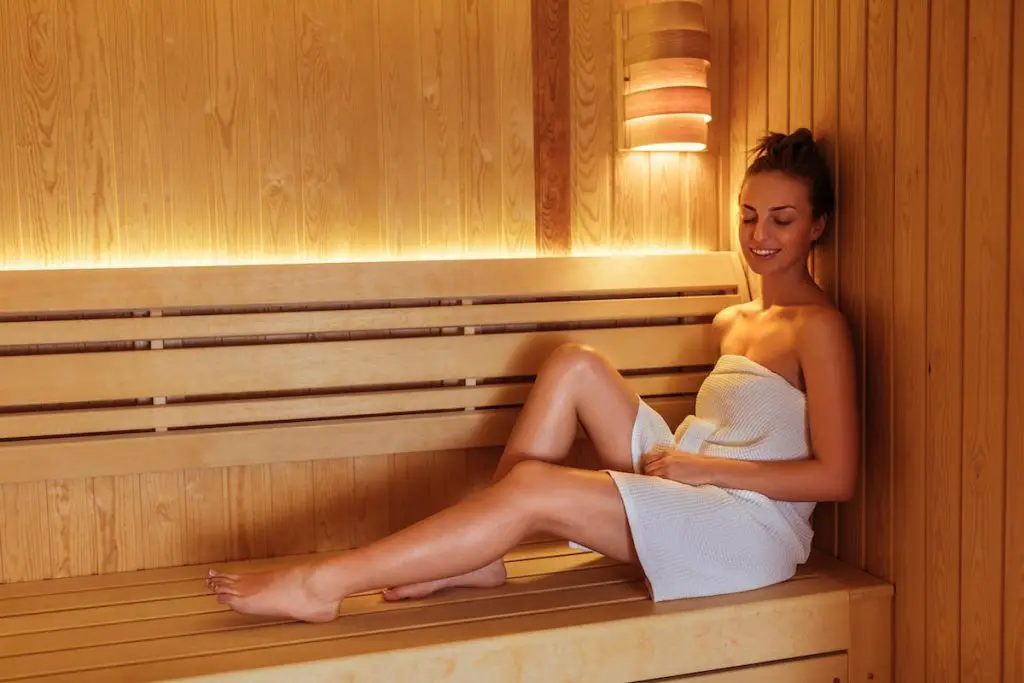I love chilling in both sauna and hot tub. But if you could only choose one, which is better, a hot tub or a sauna? Are there any differences in the health benefits between a hot tub and a sauna, and should you use a sauna or hot tub first?
Let�s find out!
What are the differences between a sauna vs. a hot tub vs. a jacuzzi?
The main differences between a sauna, hot tub, or jacuzzi are that saunas operate in higher temperatures from 90�F to 200�F (32�C to 93�C) and you are exposed to hot air, which has lower thermal conductivity. The temperature in hot tubs and jacuzzis typically ranges from 100�F to 102�F (38�C to 39�C) but you are in contact with hot water which has much higher thermal conductivity.�
Another difference between a sauna vs. a hot tub is that hot tubs typically have water jets for massage and light hydrotherapy. Saunas offer usually only heat, but you can also use saunas for aromatherapy if you use essential oils, and you can do light stretching exercises in a sauna.
Keep reading this article and I will explain the differences between hot tubs, spas, jacuzzis and sauna in detail.
Sauna vs. Hot Tub or Jacuzzi
Jacuzzis and saunas can both be relaxing after a workout at the gym or a stressful day. I�m sure you know the feeling after getting up from a hot tub after a long soak or after cooling down post a sauna session. It�s a relaxing feeling, right?
Here�s a table highlighting the main differences and benefits for using saunas and hot tubs:
| Functions | Temperature range | Benefits | Tips | |
|---|---|---|---|---|
| Sauna | Exposure to high heat, aromatherapy | 90�F to 200�F (32�C to 93�C) | Relaxation, stress-relief, cardio-vascular health benefits, improved sleep, skin and hair benefits, aromatherapy with essential oils. | Remember to drink plenty of fluids to avoid dehydration. Avoid staying in sauna for more than 10-20 minutes at a time. |
| Hot tub | Exposure to warm water, hydrotherapy, massaging water jets | 100�F to 102�F (38�C to 39�C) | Hydrotherapy, massaging water jets, relaxing sound of water, relaxation, stress-relief, cardio-vascular health benefits, improved sleep, skin and hair benefits. | You can stay in a hot tub up to 30 – 45 minutes at a time if stay hydrated and monitor the water temperature. |
One thing that I’ve personally noticed is that hot tubs are a much more social experience. I’ve noticed that people typically stay quiet in saunas but a hot tub session can easily turn into a party. It’s much easier to listen to music in a hot tub whereas bringing a phone into a sauna is not a good idea.

Next, let�s discuss the possible health benefits of saunas and hot tubs and whether one is better than the other.
Hot tub vs. Sauna Health Benefits – Which is Better for You?
Saunas and hot tubs offer very similar benefits to your health.
According to a study published in the The American Journal of Medicine , the possible health benefits include:
, the possible health benefits include:
- Cardio-vascular health benefits, such as lower blood pressure
- Relief to patients with asthma and chronic bronchitis
- Relief joint pain
- Skin and hair benefits
Which is better for you – sauna or hot tub?
Watch this video of Dr. Rhonda Patrick, an expert in longevity and optimizing health, discussing the differences between saunas and hot baths for your health.
In the video, she says that hot baths and hot tubs are a great alternative to induce heat stress in your body for people who don�t have access to a sauna.
Hot Tub or Sauna for Sore Muscles
Both saunas and hot tubs can offer the benefits of heat stress to your body. This includes relief for joints and sore muscles. Both can also offer benefits for cardio-vascular health and help you lower stress.
However, hot tubs offer one major benefit that saunas don’t, which is massaging water jets and hydrotherapy.
One thing you can do in a sauna, however, is stretching. In a sauna, you have more room for light stretching exercises which can be tricky to do in a hot tub.
The key takeaway here is that both saunas and hot tubs can help with muscle soreness, but overall, hot tubs are better for sore muscles because of the massaging water jets.

Should I Use a Hot Tub Before or After the Sauna?
If you go to a spa that offers both a sauna and hot tub, you may think if you should jump in the tub before going to the sauna or vise versa.
The short answer is that you can use either sauna or a hot tub first. You can even do multiple rounds of both with short breaks in between, which is my personal favorite way to enjoy both. Just remember to keep hydrated and take breaks to cool down in between the sessions!
However, there are couple things to keep in mind before you choose whether to jump in the hot tub or sauna first:
- Hot tub water should be always kept clean. Saunas will make you sweat but the sauna also cleans your skin and hair of dirt and dead skin cells. So it might be a good idea to go to the sauna first and rinse your body in the shower before jumping into a hot tub.
- Both the hot tub and sauna will increase your body temperature. However, the overall temperature and the amount of heat conducted into your body is much higher. If you are already feeling very hot from soaking in the hot tub, you may overheat in the sauna. That�s why you should take a break to cool down between the sauna and hot tub or jacuzzi.
So the key takeaway here is that you can use either the sauna or hot tub first depending on your preference, as long as you remember to stay hydrated and let your body cool down between the sessions.
Hot Tub or a Sauna – Which Should You Buy for Your Home?
Both saunas and hot tubs are quite expensive and they require a lot of space.
If you can only choose one of them to install in your home, should you buy a sauna or a hot tub?
I put together the main things to consider when making a purchasing decision between sauna vs hot tub:
| Price | Cost to operate | Building permit | |
|---|---|---|---|
| Sauna | Depending on the size, materials and heat source: $2,000 – $20,000 | $5 – $20 per month. Costs come mainly from electricity and cleaning of the sauna. | You may need a building permit for larger outdoor saunas larger than 120 sq ft |
| Hot tub | Depending on the size and style: $1,000 – $8,000 | $30 – $60 per month. Costs come from mainly electricity, water and treating the water in the tub | You may need a permit for in-ground or custom-built hot tubs |
While there�s a huge range for the cost for both saunas and hot tubs, I can tell you that on average saunas are more expensive to build but the monthly costs to operate a sauna are much lower.
Hot tubs use a lot more water and electricity, so the cost of utilities is the main factor to consider besides the initial purchase price of the hot tub.
Most people install an electric heater in the sauna, so electricity is the main cost for operating a sauna. Besides that, saunas don�t really have other costs to operate, apart from cleaning the sauna a few times per year.
Let me know in the comments which one is your favorite, sauna vs hot tub. If you have any questions or feedback, I would love to hear them in the comments!

